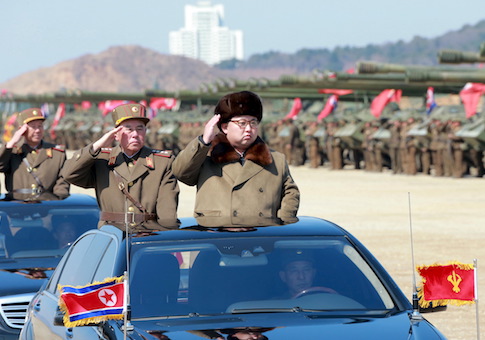WASHINGTON (Reuters) - North Korea's leader Kim Jong Un appears more "risk-tolerant, arrogant and impulsive" than his father as he forges ahead with military programs that have left even China - Pyongyang's top ally - feeling frustrated, a top U.S. general said on Tuesday.
Army General Vincent Brooks, who is President Barack Obama's nominee to lead American forces in South Korea, told a Senate hearing that he was "not optimistic" about North Korea's direction.
The reclusive state conducted a fourth nuclear test in January and a long-range rocket launch in February, both in contravention of U.N. Security Council resolutions. Last week, it failed to launch what the United States believes was an intermediate-range ballistic missile.
"Compared to his father, Kim Jong Un is more aggressive with advancing the North’s nuclear program and ignoring international concerns," Brooks said in written responses to questions from the Senate Armed Services Committee.
He noted Kim's purges and executions of senior officials since he succeeded his father, Kim Jong Il, who died in 2011, adding: "We now see greater potential for instability as a result of Kim Jong Un's behaviors and the absence of advisers he is willing to consult."
Some experts expect North Korea to conduct its fifth nuclear test in the near future, possibly before its party congress in early May.
Brooks said at his Senate confirmation hearing that some Chinese military leaders have told him "they don't have the influence they once had" with Pyongyang, although he questioned that.
"It is my assessment that China is in fact frustrated, yet unwilling to apply pressures that could threaten the viability of the North Korea" regime, he said in written responses to the committee.
In March, North Korea said it had miniaturized a nuclear warhead to be mounted on ballistic missiles and a simulated re-entry test of a ballistic missile, which could indicate advances in its ICBM program, if true.[ nL3N17B4GZ]
But South Korean officials questioned those assertions and said the North was several years away from developing an ICBM.
Brooks restated the U.S. military's position that it must be prepared defensively by assuming the worst.
"Given the amount of time and resources the regime devotes to nuclear and missile programs, we must assume North Korea has the technical capability to mount and deliver a nuclear warhead using ballistic missiles," he said.
Brooks added that South Korea was carrying a "significant load" when it comes to U.S. forces in South Korea. He said that South Korea was paying for 92 percent of a $10.8 billion U.S. Defense Department construction project.
(Reporting by Phil Stewart and Idrees Ali; editing by Andrew Hay)
